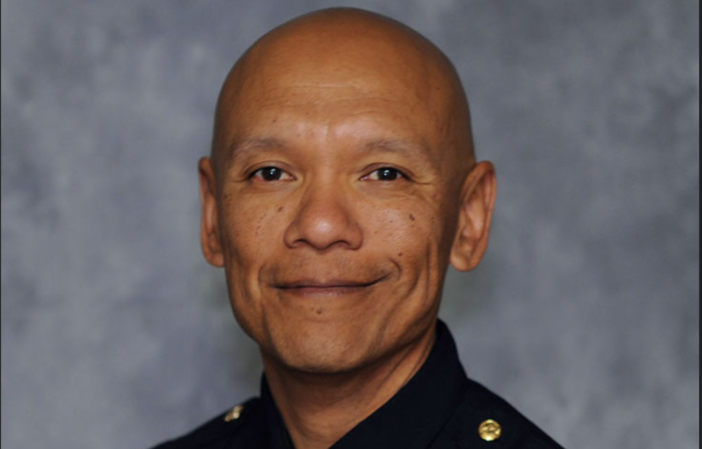Of the 30 years that Criminal Intelligence Det. Ray Perez served on the Beverly Hills Police Department, he had multiple myeloma for 13 of them. Thirteen.
That’s 13 years of battling both cancer and bad guys, as Perez worked on some of Beverly Hills PD’s most dangerous domestic terrorism cases. Thirteen years of caring for his elderly parents while downplaying his own illness. Thirteen years of being a devoted husband and a father to a scholarship-level softball-playing daughter.
Ray Perez showed up to work every day for 13 years while undergoing chemotherapy, experimental treatments, rising medical bills and crushing fatigue, and his colleagues say he didn’t complain once.
This week is National Police Week, which pays tribute to local, state and federal law enforcement officers, particularly those who have died or have been disabled in the line of duty. The nation remembers fallen officers as possessing a level of fearlessness most mortals will never come close to achieving. Even in this unfathomably courageous company, Perez’ bravery is unique.
Due to the unusual nature of police work, cancers are often considered “line of duty” diseases. In Beverly Hills, the number of residential and municipal cancer cases is so high that it at one point drew the attention of Erin Brockovich. Perez’ friends and colleagues believe his case fits within Beverly Hills’ “cancer cluster.” It certainly was unusual in that he was in his 30s when he was diagnosed with a disease that usually strikes people in their 70s.
Multiple myeloma is a cancer of plasma cells, a component of blood that makes the antibodies that attack and kill germs. Most blood cancers don’t go away, they just quiet down awhile.
The domestic terrorism unit works like those plasma cells, uncovering bad actors, rooting them out and removing them. If Ray ever considered the irony of battling an unrelenting disease that attacks the body’s “police force,” he didn’t let on. He did his work, and he did it well.
His personal perseverance and dedication to the craft of law enforcement earned him respect from his colleagues in Beverly Hills, as well as from the federal and state agents he worked with regularly.
Beverly Hills Cop
Just as cancer didn’t stop him, the trappings of Beverly Hills didn’t faze him. Perez began his career as a cadet in 1987, the year Beverly Hills Cop 2 came out. It seemed as though every aspiring officer in the nation wanted to report to duty beneath that famous gold-tipped Spanish revival cupola. BHPD didn’t have the time or patience for star-struck cadets out for glory. They were looking for people like Perez.
In 1988, Perez was sworn in as a police officer, proving himself a dedicated community servant and a trusted member of the force. He spent the majority of his career working graveyard because he liked the work: the only people out late at night are cops and robbers.
In Southern California, the late ’80s and early ’90s marked the height of car jackings, violent crimes and robberies. Perez was the guy other officers wanted to have out in the field with them — a loyal, dedicated individual who made quality arrests and always had his fellow officers’ backs.
He carried that reputation over the course of his assignments as a field training officer, a SWAT member and to the Special Tactics Unit. His last assignment was as a detective for Counterterrorism 6 until he retired in March 2018, at the age of 51.
His fellow officers are reluctant to talk about the specific criminals Perez helped bring to justice. Crime syndicates don’t go away, they just quiet down awhile. But suffice to say, his work spanned the globe, as did the respect he earned.
A sports fan — any sport would do — Perez would try to fit in a ball game in any city his work took him to. Back at home, he rooted for his beloved Dodgers and would hang out with his friends from BHPD at Dodger Stadium, even if they had the audacity to cheer for the wrong teams.
Even after retirement, Perez would meet up with his friends from BHPD for monthly lunches, brunches or barbecues. He would talk about sports. He’d talk about his daughter, a soon-to-be college grad of whom he was infinitely proud. He’d talk about his parents, who had adopted him from Cuba when he was an infant. And he’d talk about his plans to one day visit Cuba. He’d been talking about that last point for a while.
Now, the conversation is over. To reflect on his legacy of strength, Perez’ colleagues, friends and family will gather in Lakewood on Saturday to memorialize Ray, share stories and raise money for the Leukemia & Lymphoma Society.
He’d been sick for 13 years. Thirteen. But he didn’t complain once, and now his illness is not the first thing people remember about him. Instead, on Peace Officers Memorial Day, Det. Ray Perez is being remembered for his sense of responsibility, dedication and bravery.
 Behind the Badge
Behind the Badge



